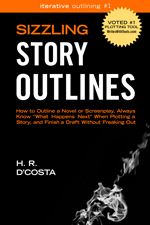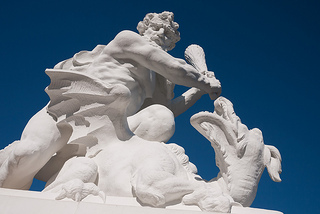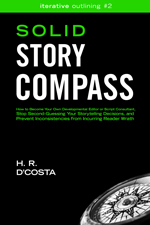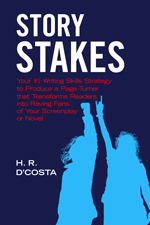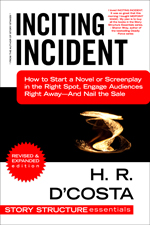CLASH OF THE TITANS, a remake of the 1981 film, stars Sam Worthington as Perseus, a demigod trying to win a war against Hades, god of the Underworld.
It isn’t technically a box office bomb. Not when it grossed $493 million worldwide, according to BoxOfficeMojo.com.
But in my humble opinion, despite its box office success…CLASH could have been so much more. Full disclosure: I haven’t seen the original source material, but from its trailer (which was included in the DVD of the 2010 film), the older version seemed like a fun, campy movie which should have yielded a super-successful remake.
To be fair, CLASH OF THE TITANS is not without its merits. It has a cool action set piece featuring killer scorpions (which Wikipedia informed me was adapted from the climax of the original). It has one of the best illustrative examples of the fork in the road–one of the essential plot points every script outline should have.
In it, Zeus offers his half-mortal son sanctuary in Olympus. Perseus refuses and instead commits to winning his earthly battle against Hades and the monstrous Kraken. The final standoff between Perseus, Hades, and the Kraken is fairly intense too, an intensity enhanced by the “ticking clock” of the solar eclipse.
Still, these positives weren’t enough to redeem the remake. Here are 6 fatal flaws which killed CLASH OF THE TITANS:
Flaw #1: Too much exposition
Too much exposition is the kiss of death to a screenplay–and CLASH OF THE TITANS was particularly high-handed with this storytelling device. The exposition was made even more glaringly obvious because, most of the time, the information was conveyed through a single character: Io.
Poor Gemma Arterton. She seemed to solely exist as an expository device.
First, Io begins the movie with a lengthy voiceover. Over a backdrop of the cosmos and constellations, she describes the war between godly brothers Zeus, Poseidon, & Hades and their parents. When the brothers won, Zeus took over as ruler of the earth and banished Hades to rule the Underworld, a pretty sucky reward for Hades’s help.
Hades’s ensuing resentment fuels the entire script, so it’s important to know the history behind it. But it would’ve been much more interesting to absorb that information if it had been doled out in bits and pieces, perhaps through cryptic remarks made by Perseus’s adopted father, Spyros.
Alternately, if it wouldn’t have been too cost-prohibitive, we could’ve also witnessed the first war between the Titans instead of being told about it…and at the very end of the sequence, Hades can vow to get his revenge.
One big chunk of exposition wouldn’t have killed the script–for some reason it did work as the beginning of Lord of the Rings: Fellowship of the Ring–but it happens again, approximately 23 minutes later. Io visits Perseus in prison and explains to him his true parentage.
Her speech is accompanied by a flashback, showing how Zeus slept with the mortal wife of a king, Acrisius, in retaliation for Acrisius’s war against the gods. I’m not sure why the movie just didn’t begin with this scene, which would have nicely shown the circumstances of Perseus’s birth, introduced us to Acrisius (who’s later used by Hades as one of his henchmen), and hinted at the thematic issues of living life as a god vs living life as a mortal man.
Interestingly, one of the screenplay drafts DID begin this way. Here’s a brief excerpt from a 2007 draft originally written by John Glenn and Travis Wright, revised by Travis Beacham, with current revisions by Lawrence Kasdan:
INT. GREAT HALL, THE PALACE OF KING ACRISIUS – NIGHT
Bloodied and battered, the King’s senior officers are gathered in a contentious war council. The GENERALS are disagreeing about strategy; the debate is near collapse into open fighting. A loud BANGING sound pierces the hubbub, and the officers slowly quiet, turning their respectful attention to–
KING ACRISIUS, a striking man, his rugged faced marked by the scars of past wars. He rises from his throne at the front of the hall. The room grows silent. His DEEP VOICE commands the huge room–
KING ACRISIUS
Now we end the debate about tactics…and begin to plan for victory
AT THE BACK OF THE HALL, as Generals rise in robust support, we see another observer–the Dog. He watches with intelligent eyes, staring at the King. Then slips away into the dim corridor.
INT. BEDCHAMBER, THE PALACE OF ACRISIUS – NIGHT
DOG’S POV: In the dim bedchamber, the SILHOUETTE of the beauteous QUEEN DANAE through the diaphanous curtain around the royal bed. A LADY-IN-WAITING removes her outer gown, revealing the Queen’s perfect body as she slips into bed. The Lady-in-Waiting leaves.
The Dog’s eyes. He moves forward.
FLOOR-LEVEL TRACKING with the Dog’s legs as he moves towards the bed. The four canine legs MORPH INTO TWO HUMAN LEGS as the CAMERA RISES behind what is now a towering male figure. He pulls the gauzy curtain roughly aside.
In the bed, the Queen is startled, then pleased.
QUEEN DANAE
My King! Has the strategy been set so quickly?
REVERSE ANGLE: The looming figure looks exactly like King Acrisius, every scar and feature identical. Silent, he looks at her hungrily.
QUEEN DANAE
Come to your Queen, my King.
He does.
INT. GREAT STAIRS, THE PALACE OF ACRISIUS – SUNRISE
The real King Acrisius wearily climbs the stairs, an AIDE at his side, Palace Guards behind.
And for the final example of exposition: while Perseus’s crew journeys to Medusa’s temple on Charon’s ferry, Io explains to Perseus the history of Medusa’s transformation from woman to monster.
Sensing a pattern, here?
When a character is just used to relay exposition, he (or she) should be cut from a script because he is pretty much irrelevant to the story events actually taking place.
Find another way to reveal the information. (As a starting point, read this article on how to cut exposition.)
Some of you may protest at eliminating Io’s character. She IS more than an expository device. She’s also Perseus’s love interest…and wasn’t that creepy?
She watched over Perseus his whole life, from the time he was a baby, thrown into the ocean in a casket, until he grew up into a man. In my opinion, this makes her a prime candidate as a maternal figure for Perseus, not his lover.
From my rusty knowledge of Greek mythology, Perseus originally was in love with Andromeda, the princess who’s supposed to be sacrificed to save Argos. Keeping Andromeda as Perseus’s love interest would’ve been a much smarter move, which takes me to my next point:
Flaw #2: No reasons to care
Hades wants to destroy the city of Argos by unleashing his beast, the Kraken. If Perseus kills the Kraken, this might weaken Hades enough for Perseus to strike Hades with a deathly blow. Since Hades caused the death of Perseus’s earthly family, this should be a goal to rally behind.
But Hades is a god…he’s supposed to be immortal, so I was more than a little skeptical about Perseus’s success in that arena. Skepticism = no emotional involvement.
Saving Argos from the Kraken…that’s another story. That, Perseus can do.
But will anyone care?
The city is ruled by a bunch of gluttonous nitwits who party lavishly while the rest of the citizens are at the brink of starvation. Good riddance to the gluttons, I say.
As for the poor citizens, on an intellectual level, no one wants to see them senselessly destroyed. But emotionally…the movie didn’t forge any kind of connection between the poverty-stricken citizens of Argos and the audience, so it was still difficult to become emotionally invested in Perseus’s goal.
As callous as it may sound, showing masses of poor people doesn’t automatically make the audience care. You have to MAKE them care, perhaps by bringing one of the citizens to the forefront and showing his story along with Perseus’s.
The same principle holds true for Andromeda, who fortunately isn’t as selfish as her parents. In disguise, she feeds bread to the poor. She even goes willingly to be hung as a sacrifice to appease Hades and stave off the Kraken.
However, depicting her as a martyr doesn’t automatically make the audience care about her. But, if she had been Perseus’s love interest instead of Io, and Perseus’s goal is to save Argos in order to protect Andromeda (and they already had overcome several obstacles to achieve the love they had), then we’ve got stakes worth talking about.
Flaw #3: Hazy boundaries of magic
In the the cool action set piece with the killer scorpions, Perseus gets stung by their lethal venom. He’s saved through the healing energy of a magical creature known as the djinn.
Say what?
I thought I was watching a movie about Greek mythology. And yes, while it’s been awhile since I cracked open a mythology text, I don’t recall ever coming across a djinn in the Hellenistic pantheon of mystical, magical creatures. With naiads and dryads and other magical people to choose from, why add a djinn to the mix?
The way he shows up just in time to save Perseus is also oh-so-convenient. Audiences hate that kind of coincidence. They get upset that you couldn’t think of something more creative.
In CLASH OF THE TITANS, it’s easy to buy that Perseus’s family’s fishing boat approached the statue of Zeus, just as the statue was cut down by the soldiers of Argos…eventually resulting in their death. It’s not so easy to buy the sudden appearance of the djinn.
It’s also tricky to understand just exactly what his powers are. He can replace lost body parts with wood and black magic; he can save Perseus from Hades’s scorpion venom; he can subdue the scorpions and turn them into carriages (which was pretty awesome)…but he can’t save himself from Medusa’s stink-eye? If he’s part wood, wouldn’t he technically be immune to her spell?
For that matter, what were the limits of the powers of the gods themselves? Hades needs Zeus’s permission to unleash the Kraken…but Hades is able to kill the soldiers who cut down Zeus’s statue at the beginning of the movie without consulting Zeus at all.
And if Hades was powerful enough to turn into harpy-like demons to kill the soldiers, why is he not strong enough to wreak havoc on earth without using Acrisius as his vessel–especially since at this point, Zeus has granted Hades free reign to unleash destruction?
If Medusa’s head is the only thing with the power to destroy the Kraken, when Hades (in harpy-like form) seizes it from Perseus, why doesn’t he disappear in a cloud of smoke the way he did at the film’s beginning? And don’t get me started on Io…who was supposed to be cursed with immortality, but then was suddenly killed by Acrisius’s sword.
Whenever you have a story with magical elements, make sure you understand not only what these magical powers consist of, but also, what they’re limited by.
Flaw #4: Too many characters
There are way too many soldiers from Argos accompanying Perseus on his journey. The 2007 script draft I quoted earlier advises the reader “not to strain to keep them straight, they’re all monster fodder.”
The movie definitely succeeded on that front. After watching it, I couldn’t tell you the name of any of the soldiers–not one. Mads Mikkelsen was Mads to me until I checked out his Titans’s character name on IMDB.
Accumulating a mass of characters only to kill them off as “monster fodder” is an approach which can work, but I don’t think it was successfully implemented here. For one thing, if you do use this monster fodder technique, you’ve got to go all the way.
Don’t give them undue focus and show them praying to Zeus (Eusebois at the 26-minute mark) or breaking a flute (Solon, 32 minutes in) or give them really long speeches about killing strange creatures (Kucuk and his brother, who join Perseus’s crew–only to abandon the mission 33 minutes later).
Only shine the spotlight on the leads whose names we’re supposed to know–like Perseus.
If you go the monster fodder route, audiences ironically won’t care about their death because the characters are mostly one-dimensional, only existing to be eaten by the monster. And if audiences don’t care about the fodder, then then won’t feel so deeply when said fodder dies. CLASH OF THE TITANS really could’ve benefited from creating heartbreaking deaths for each Argos solider since it was sorely lacking in stakes (flaw #2).
In another screenwriting article, I compared Gladiator to King Arthur, which were both written by David Franzoni. I may’ve given KING ARTHUR a lot of flack, but from what I recall, the movie does a great job of bringing some soldiers to the forefront, while leaving others as background extras.
Because of that distinction, when something major happens to one of the soldiers at this amazing battle on top of a frozen lake, if you’re not crying, you at least understand the inclination to weep.
Flaw #5: Lack of clarity
While I liked the scorpion action set piece, I freely admit I didn’t understand what was going on half the time. It wasn’t exactly clear what the scorpions were doing–and to which soldier–and not because most of the crew was supposed to be composed of nameless monster fodder. The action happened quickly.
Too quickly.
Acrisius’s blood creates the scorpions when it mixes with the desert. While Perseus and his Argos crew have to deal with the scorpions, Acrisius must’ve escaped. I wasn’t sure. In fact, I thought he died. The only reason I know he survived the battle is because he reappears again near the end of Act Two to deal Perseus a devastating blow.
Your audience should never be confused about what’s happening. It doesn’t mean that you spell everything out for them–a little mystery is usually a good thing–but crucial events should be written out clearly. All of your assumptions should be spelled out if they’re necessary to understand what’s going on.
When writing a major action set piece, try to unpack each moment, each sound and image. Devote a single line to the object you want us to focus on. Here’s an example taken from Crafty Screenwriting by Alex Epstein:
JOE hits the ground rolling, firing the .45
BAM! BAM! BAM! as he rolls –STEVE takes a slug in the gut, smashes
backward through the window, glass shattering –…falling…
…falling…
– THUMP! Steve slams into a car roof, arms
sprawled awkwardly.
Bits and pieces, even wholesale chunks, of your set piece may get cut in the editing process, but you can be pretty sure that the audience will see and hear what’s unspooling in your own mind.
Bonus: you usually end up milking your action set piece for all it’s worth.
Flaw #6: Awkward pacing
The stakes, the goals, the obstacles, the set pieces…these are all supposed to get bigger as your script hurtles towards its climax. But fast-paced scenes have to be balanced with moments to pause and reflect. If your script contains a non-stop series of explosions and their ilk, your audience will tire of them and develop “action-fatigue.”
At the same time, your “slower” moments should not bring the plot to a screeching halt just when everything gets exciting. In CLASH OF THE TITANS, there were two rather slowish scenes which occurred after the midpoint.
One is when Perseus (finally!) reaches the Stygian Witches and learns that he can kill the Kraken by using Medusa’s head. The other is when he and Io engage in a flirtatious (ick!) swordfight as she tries to teach him how to outwit Medusa.
Both of these scenes had moments of action & lighthearted humor and pushed the plot forward. But coming on the heels of the scorpion fight, they felt well…anticlimactic. That’s one of the trickiest aspects of pacing: slowing the pace down while building towards the final, climactic showdown.
I’m not sure how to have paced CLASH OF THE TITANS better, but here are examples from action thrillers which had slow, post-midpoint moments which worked.
- Mission Impossible 4 – Ghost Protocol: After their disastrous encounter with Wistrom and Moreau, Ethan Hunt’s team slows things down to process, prepare, and plan. Brandt makes a major, major reveal. Ethan negotiates with an arms dealer. Later, Jane and Ethan discuss the effects of killing for revenge; while on a lighter note, Brandt reviews their next plan with Benji who promises “to catch Brandt.”
- Taken: Bryan Mills finds a girl wearing his dead daughter’s jacket and cries by her bedside. The poignant scene reinforces the stakes, showing us what could happen to Kimmy if Bryan doesn’t succeed.
- Casino Royale: After being tortured, Bond recuperates at a gorgeous Italian villa with Vesper. After what he’s been through, the audience feels that he’s earned a bit of respite. Plus, the scenes where he declares his love for Vesper make him so uncharacteristically vulnerable, they’re riveting to watch.
Greek Statue by Martin Sotirov
